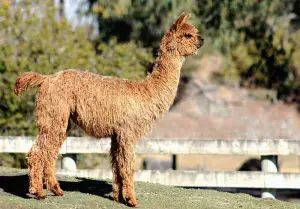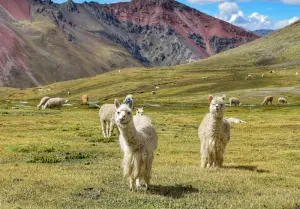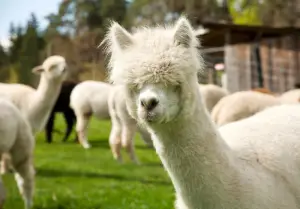Owning Alpacas As Pets: What You Need to Know
Alpacas are unique and delightful animals. They have many uses, but do they make good pets for kids? Can they be happy indoors? Is it even legal to own alpacas in the US?
Whether or not alpacas make good pets depends on what qualities are most important to you in a pet. Read on for further explanation.
Qualities That Make Alpacas Good Pets
Alpacas were originally used as light pack animals in the Andes Mountains and the surrounding areas in South America. Their surefootedness was very useful to travelers of the time. They also became highly desirable for their wool, which can be processed into clothing, blankets, and bags.
Now, many years later, they are rarely used as pack animals anymore. But their fiber is in high demand both in South America and the US, among other places.
Alpacas Produce Valuable Fiber 
Alpaca fiber is perhaps the most desirable of all the wool options out there. Warmer and lighter than sheep wool and at least as soft as the cashmere made from goat wool, it’s hard to beat. But even if you don’t raise alpacas for their wool specifically, there will still be some special care involving their wool.
Alpaca wool grows thick and fast, and it must be shorn once a year. If it isn’t shorn every year, it will become so hot and heavy and dirty that it will be impossible for the alpacas to groom themselves or stay at a comfortable temperature.
Skin diseases and external parasites can become a problem if alpaca fiber is allowed to grow and become matted indefinitely, so you should be prepared to arrange for your alpacas to be shorn once a year, even if you don’t care about the fiber.
If you want to shear your alpacas yourself, have someone teach you before you give it a try. Youtube videos only go so far with things like this, and there is a chance you could injure yourself or your alpaca if you try to wing it without any guidance.
If you can find a local fellow alpaca enthusiast, you will probably be able to pay them $35-$50 per alpaca to shear them for you. You might even be able to work out a deal for a better price if you let them keep the fiber. If you don’t want it anyway, there’s a great win-win.
Alpacas Are Entertaining
Alpacas are herd animals and must have others of their kind to interact with at all times. An alpaca kept alone will become depressed or begin to act out with detrimental behaviors or both. But they are happy in a group of fellow alpacas.
It can be relaxing to watch them graze and mosey around the field. And it can be entertaining to watch them interact with each other and work out small kerfuffles.
Negative Qualities In Pet Alpacas
While there are lots of endearing qualities to alpacas, there are, unfortunately, also aspects of alpaca ownership that imply alpacas may not be the best pet for most individuals. If these negative traits are particularly repugnant to you, alpacas may not be the best choice for your household.
Alpacas Spit
While most alpacas don’t really spit at anything that moves like the media would have us believe, they do literally spit saliva as a warning if they feel that you are getting too close. They are prey animals without any natural defense tools like claws or teeth, so you can’t really blame them for trying to deter possible predators from as far away as possible.
Alpacas actually have two different kinds of spit. The first one they send toward an individual who is making them uncomfortable is just regular old saliva. Clear-ish and not particularly smelly. But, if that doesn’t get the point across, then they get serious.
They bring out the secondary epic spit wad. A ball of green goo made up of half-digested grass and foliage brought right up from their stomach. It splatters. It stains clothes. It smells horrendous.
So even though it’s not a frequent occurrence and can be discouraged with careful training and earning the alpacas’ trust, it qualifies as a negative trait. You can learn more about why alpacas spit here.
Alpacas Aren’t Fond of Petting
Alpacas also don’t particularly care for petting. They are not like dogs, who want to be petted every moment of every day. They are not even like cats, who will pretend to want to be petted and tolerate it for a moment before running away. They just don’t like it. They’re naturally less physical in their day-to-day interactions with others of their kind than many other species.
Just like any animal, though, all alpacas are different. Some may be trained to accept a limited amount of petting in exchange for a treat. But you should avoid forcing pets on your alpacas as it will be a negative experience for them and cause them to feel less inclined to approach you in the future or to cooperate with halter training or other things they may already be wary of.
If getting an animal that enjoys petting is really important to you, a dog or cat might be a much more satisfying choice.
Even though hand-rearing some animals will make them more friendly to humans and particularly more attached to the person who raised them, it is not so with alpacas.
Berserk Male Syndrome Can Be An Issue 
While younger alpacas may be more accepting of petting, it can also cause big problems. Alpacas should never be raised solely among humans if growing up with a herd is at all possible. It may sometimes be necessary to bottle-feed a newborn alpaca whose mother isn’t producing milk, or decided to reject him, or passed away because of giving birth. But if an alpaca, particularly a male, doesn’t grow up among his own kind, the results can be disastrous.
Berserk Male Syndrome is a condition that afflicts adult intact male alpacas and llamas who grew up more among humans rather than others of their own kind. When raised by humans, they never learn the manners and expectations of the herd. So when those hormones kick in around one year of age, they don’t know what to do with themselves.
While properly raised alpacas compete for dominance and the top rank among the other herd members, berserk males go crazy and fight everyone and everything in their path without regard for anything.
They get a running start, launch into the air, tuck in their legs, and ram chest first into anything in their path with enough force to break it. Whether it’s another alpaca or a human, they don’t care. Humans are alpacas to them as much as other alpacas are, and all they know is that they want to dominate everything.
This condition is usually so dangerous that it can’t be trained out of an animal, and often euthanasia is the only option to protect the rest of the herd as well as the farmers. If a young male alpaca must be hand-reared, he should be castrated as early as possible to prevent or at least lessen the negative effects of not growing up with a herd.
Alpacas Are Too Big To Keep Indoors
Alpacas are smaller than llamas. They get as tall as four or five feet at the head. But that’s still pretty tall for an indoor pet. They also weigh in at as much as 175 lbs. They could easily break things if spooked into moving quickly. And they’re meant to be in open fields with the sky above them and lots of space to roam.
Additionally, alpacas are herd animals. They will not be happy by themselves. Even if you plan to be home most of the time, you are not a suitable substitute for another alpaca. It’s best to get three, in case anything should happen to one of them so that the other still has a herd member to keep it company.
Herd animals kept alone will become depressed and lethargic or will act out with negative behaviors out of frustration and boredom. Which can result in damaged and broken furniture and drywall in the case of an animal so large being kept inside.
Alpacas Don’t Always Do Well With Children
Alpacas are not an excellent choice for young children. They grow to be tall and heavy enough that small children could be in danger of being stepped on, either accidentally or intentionally, by a short-tempered alpaca if left unsupervised. Since they don’t typically enjoy petting and can’t carry a significant amount of weight, there isn’t much that young kids can do with them.
For kids old enough to participate in showing alpacas, however, such as in 4H, alpacas do have one advantage over most other farm animals. Alpaca meat isn’t a recognized animal meat in most states. So alpacas can be shown for fiber and other qualities without the ultimate result of shipping the animals off to be slaughtered after all that time spent getting them ready to show.
For softer-hearted kids who don’t enjoy sending their winners off to become burgers, showing alpacas instead could be an excellent alternative.
Is It Legal To Own Alpacas?
Alpacas are completely legal to own in every US state. You might run into difficulties with transport, though, as each state has different regulations regarding livestock crossing state lines. Oftentimes the necessary paperwork will require an exam by a qualified veterinarian. Veterinary exams can range from $40-$150 depending on the state and whether you are taking the alpaca to the vet or the vet is coming out to your farm.
But you can legally own an alpaca in your backyard. As long as you provide it with at least a friend or two, some grazing space, and a shelter, it and its friends should be able to live comfortably and healthily.
But keep in mind that if you live near neighbors or in the city with a really small yard, that may not be an ideal environment for alpacas. And if you live in a neighborhood with a homeowners association, you should check on the pet policy. Many homeowners associations don’t allow farm animals in their areas.
So Can Alpacas Make Good Pets?
The short answer is no, not really. Not in the typical sense of the word “pet.” Alpacas generally don’t want or tolerate much petting, and it can take a lot of time and patience to win any trust from them at all. And if you want an indoor pet, an alpaca’s size and need for others of its kind, keep them from being an ideal option.
The maintenance required for their wool, especially if you don’t want to collect the fiber to sell or process yourself, is an additional downside. And if you were hoping that raising one from a baby would bring you better results, unfortunately, it won’t. And young children are best kept away from these taller, less affectionate farm animals.
So no, alpacas are not the best choice for a traditional family pet.
If, however, you are interested in raising alpacas for fiber, or at least don’t mind having them shorn every year regardless, alpacas can make entertaining homestead animals. They are smaller than llamas, which may suit smaller farms much better, and they can legally be kept in any part of the US. And your kids can participate in competitive shows without having to send their alpacas to market afterward.
If the latter qualities are more important to you, then alpacas could be a good option for your family or homestead. If you’d like to read more on alpacas to help you decide whether they would be a good choice for you, please check out our alpaca section full of additional free resources.

